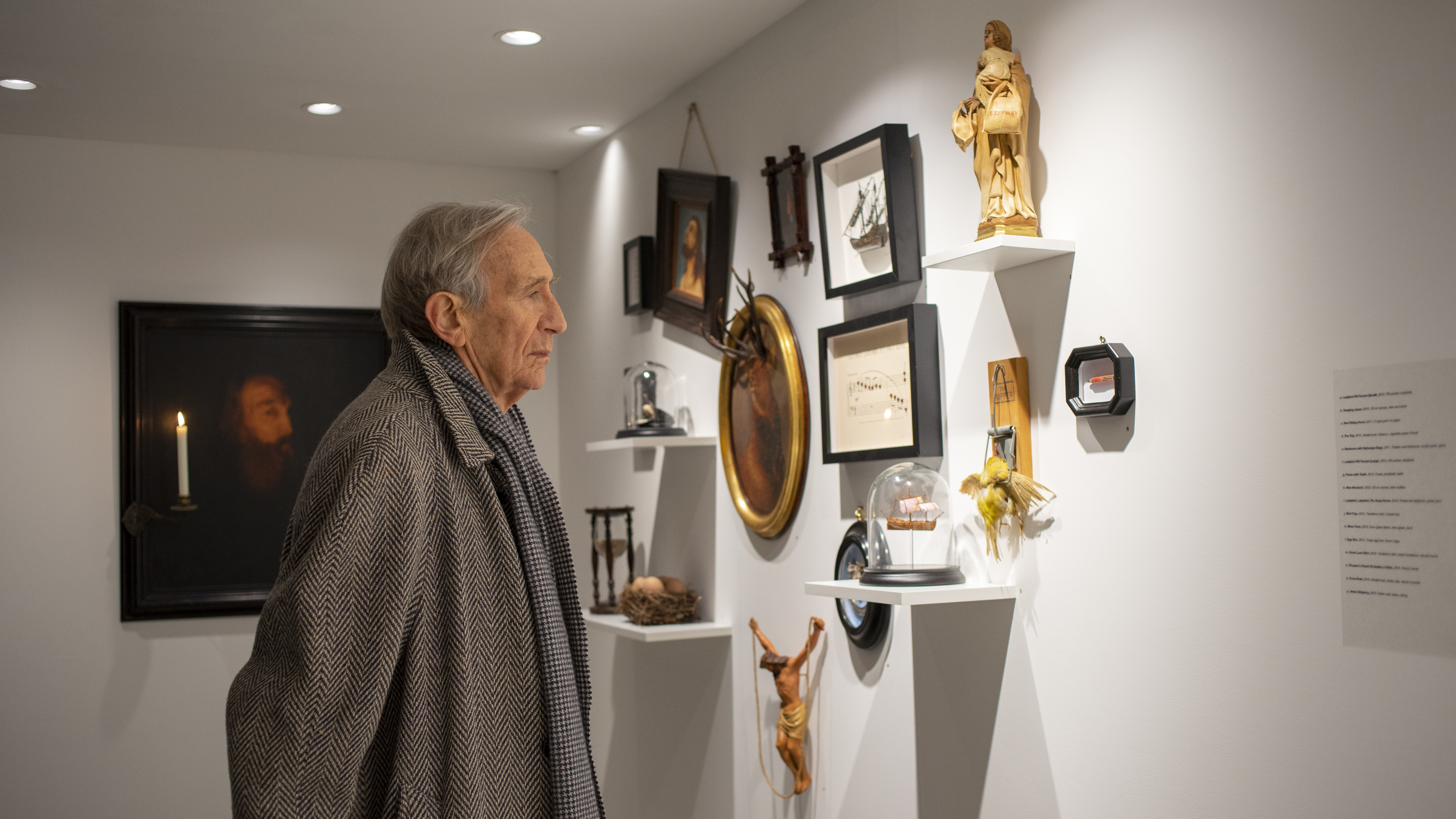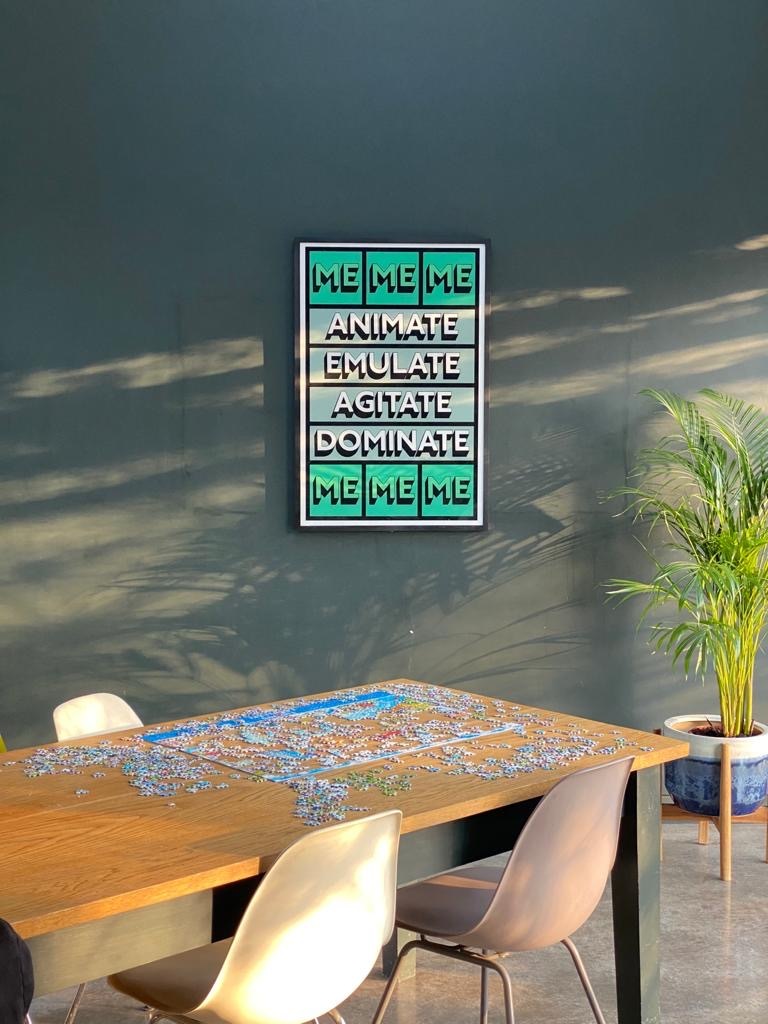Thinking of buying art for your home? Don’t panic. Although art is one of the most expensive investments you can make in your home, if you buy the right pieces you’ll have something to treasure forever, through a lifetime of home moves or renovations. You’ll also have an investment for the future or precious pieces to hand down to the next generation. Still, the process can be daunting so follow our step-by-step guide to get you through to purchase…
1. Always Buy What You Love
This is Hang-Up’s number one mantra. Go with your intuition, no matter where you plan to put your artwork because you’ll be looking at it every day. If a piece is going up on your walls, steer clear of trying to match a colour scheme or looking at investment only. Instead, consider pieces that spark memories – of a time in life, a fantastic holiday or a special someone, for example.

David Shrigley 'I've Never Seen You' and and Harland Miller 'High on Hope', courtesy of one of our happy customers.
@mrschryss
2. Find Your Favourite Artists
Walking into a gallery and attempting to choose a piece there and then can be overwhelming. Instead, research artists that you like and then keep an eye out for exhibitions or print releases from them. Social accounts from artists and galleries make a great starting point: following them will ensure you’re kept up to date with new exhibitions or print releases. Find some of our favourite artists on Instagram at @banksy, @delphinelebourgeois, @timfishlock, @davewhitestudio, @davidshrigley, @derrickadamsny
3. Make Art the Focus
Forget shoehorning pieces into your design scheme – make the art >the< scheme. We know we’re biased, but great art makes a brilliant centrepoint for your room. If you’re decorating from scratch, plan which pieces you want to feature on the walls, then choose furniture, paint colours and accessories that complement them – whether in colour, style or time period.

The Connor Brothers, We Must Be Careful, 2015.
@highfidelityhome
4. Don't Go 'Matchy Matchy'
Anna Wintour’s infamously dismissive phrase works just as well for art as for fashion. Hanging a whole room in pieces by the same artist or in the same colourway will make it feel bland and boring. Instead, shake things up with different mediums such as oils, watercolour and sculpture, and opt for a mix of genres – still lifes, figurative pieces and urban art, for example. Opt for a mix of sizes too, filling a large, empty wall with one huge piece, and hanging intimate corners or nooks with smaller, surprising works.


The Connor Brothers 'A Load of Fuss About Fuck All' (left) & works by Nancy Fouts (right)
5. Living Room or Bedroom?
You might want art that works as a conversation starter and reveals your personality in public areas such as the living room – to show your love of music or political leanings, for example. Meanwhile, the bedroom might be a place for calm contemplation – or vibrant voyeurism – depending on your taste. Make the right choice and art will set the mood, personalising your space and making it more inviting.

Paperback book by The Connor Brothers
6. Consider the Light
Because bright light can be damaging, it’s best not to display your art in an area that gets full sun. You’ll need to consider this when purchasing, because it will dictate the size and shape of the work. Sunlight damages art because of fade, so consider using glass that protects from heat and sunlight when you get it framed too.

The Connor Brothers
7. Don't Make the Frame An Afterthought
At best, a bad frame will jar with your piece. At worst, it can make the whole room look cheap, old-fashioned or simply slightly wrong. If you’re investing in art, it’s also worth investing in a frame to show off your piece to the best effect. A good gallery will be able to frame your work to ensure it sets off a room, or recommend a company to do it for you.

One of our favourite #HangUpatHome, displaying Banksy, David Shrigley, KAWS and The Connor Brothers.
8. Ask the Experts
If you’re new to art buying, making a big purchase can seem overwhelming. If you need guidance on artists to choose, take some snaps of your home and show them to the staff. Often, your taste in homes will mirror your taste in art, so they will be able to guide you towards artists you may enjoy. Figurative art often works particularly well alongside the delicate period features of old houses, for example, while huge, vibrant pieces will sing on the large white spaces of new builds.
9. Embrace Credit
Pictures and other art pieces will probably be one of the biggest investments you’ll make for your home – but, as works by respected artists usually increase in value over time, it’s worth paying for quality limited editions or originals. Art finance schemes are a great way to afford art that might otherwise be beyond budget: If you’re purchasing from Hang-Up, you can use the Own Art scheme, which facilitates interest-free loans spread over ten months for pieces up to £25,000.

Tim Fishlock's 'Animate Me' lightbox
@JOHNPERKINSPROJECTSLTD
For more on choosing art, it’s worth reading How To on starting an art collection, which covers some of the practicalities associated with making a purchase. If you’d like to talk about pieces for your home, please get in touch.
More from Lifestyle
Artists
Food Meets Art
7 Aug 2023 | 4 min read
Artists
Artist Influences
22 May 2023 | 3 min read
Artists
Art For The Seasons
11 May 2023 | 4 min read
Artists
Public Art Installations We Love
22 Feb 2023 | 8 min read
Lifestyle
Hang-Up's Highlights of 2022
15 Dec 2022
Lifestyle
Hang-Up’s End of Year Art Quiz 2022 | Part 2
12 Dec 2022
Lifestyle
Hang-Up’s End of Year Art Quiz 2022 | Part 1
6 Dec 2022
Lifestyle
How To | Choose Art for Your Home
2 Aug 2022

Lifestyle
On the Shelf | The Best Art Books Out This Spring
16 May 2022






